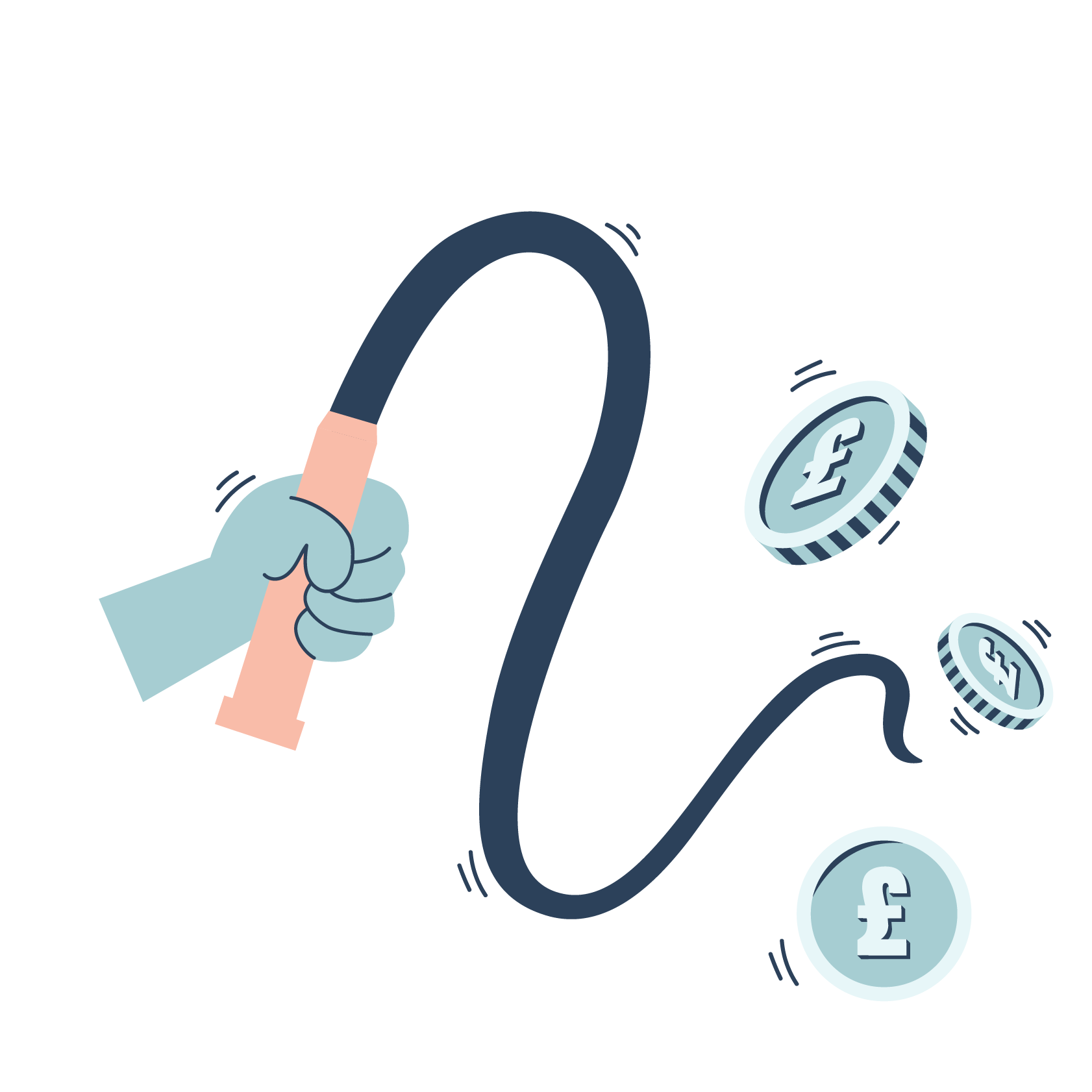Quid’s English Glossary
Have you ever been in a situation where conversation turns to money and suddenly everyone sounds like they are speaking a foreign language? Do you keep hearing complicated or unfamiliar phrases and everyone else is nodding along apart from you? Despite how it feels, you are far from alone: based on our research, 65% of Brits admit they have struggled to understand everyday financial terms. Worse yet, more than a third say this confusion is costly, estimating their money mix-ups have cost an average of £1,366 in their lifetime.
Sadly, these complex financial terms are even more costly for those living in, but not born in the UK, with nearly a quarter saying this language confusion has caused them to pay more than expected for something, and almost one fifth have underestimated their tax burden.
Navigating the language of money - especially when English isn’t your first language - can be overwhelming, which is why Remitly has decoded 25 of the most common and confusing ‘Quid’s English’ phrases, identified through research. Covering casual slang to complex terms, this easy-to-use glossary is your first step to navigating your next conversation about pounds and pence like a pro.
About the research
The poll of 2,500 adults across the UK, including 500 adults who did not speak English as their first language, was conducted by OnePoll between 15-27 March 2024.
Annuity
Imagine this scenario: you just retired, and you receive your retirement savings (pension) as a single lump sum…how would you make sure it will last the rest of your life? It feels impossible, which is why annuities exist. These are financial products that spread out payments, such as your pension, into regular intervals, so that you receive it bit by bit.
APR - Annual Percentage Rate
Put simply, APR is a percentage that tells you the total yearly cost of borrowing money. Think of It as the total price tag on your loan. It includes all finance fees associated with the loan (if any), not just the interest rate you would be charged on the amount you borrowed. So, if you borrow £1,000 at an APR of 15%, by the end of the year, you will owe £1,150, assuming all costs are included upfront and there's no compounding. APRs are shown so you can compare between loan products apples-to-apples. Remember, in some cases, the APR applicable to your specific loan will only be confirmed once your loan is approved.
Arrears
As in ‘borrowers fear arrears.’ The term refers to any past-due payments you owe (or are owed to you), including rent or loan repayments. In some cases, late fees or interest are charged continuously on these outstanding bills, meaning that arrears can be much higher than the original amount owed.
Brassic
This isn’t just slang – it’s double slang: brassic comes from ‘boracic lint’ - Cockney slang for ‘skint’ - which is in turn a slang way of saying you are low on funds.
Burning
When Brits say money is ‘burning a hole in their pocket,’ they are referring to the urge to spend money unnecessarily—or ‘like it’s on fire.’ If heat suggests spending money, cold means the opposite: during an economic ‘cooldown,’ you might ‘freeze’ an account to hold onto your ‘cold hard cash.’
Capital gain
You make capital gains when you sell an asset–anything from a stock to a house – for more than what you bought it for. Whatever extra money you make on this is your own to keep, but there is a catch: often, you have to pay tax on whatever capital gains you’ve made.
Compound interest
You may know the analogy about a small snowball at the top of a hill. As it rolls down, it picks up more snow, growing bigger and faster. Compound interest is an example of this ‘snowball effect.’ The interest you earn in your savings account this month will help you earn even more interest next month. If you don’t withdraw, your compound interest will continue to grow, which is why you'll often hear that it's never too soon to save.
Flossing
Flossing, or flossy is a slang phrase popularised by 2000s rap and hip hop to describe showing off your wealth, and not a way of incorporating Pound notes into your oral hygiene routine.
Go Dutch
Most commonly used on dates, ‘Going Dutch’ is slang for splitting the bill, so everyone pays only for what they ordered. However, in Holland, Netherlanders do not say ‘Going Us’ when splitting bills.
In perpetuity
"In perpetuity" is a fancy finance phrase for forever (and ever). It’s not the most common, but it is important, because you’ll be locked into whatever terms you sign on.
It’s my treat
When you spend your own money on something for anyone else – this could be picking up the bill in a restaurant, or simply buying a friend an ice cream.
Liquidity
Liquidity refers to how quickly you could convert an asset into cash. For instance, stocks have high liquidity: you can sell a stock for market value and, in many cases, have access to the cash quickly. Real estate takes much more time to sell, so ironically a backyard pool isn’t that liquid.
Put it on my tab
A ‘Tab’ is a record of what you have ordered or used but not yet paid for, especially in a bar or restaurant.
On the house
If a bar, restaurant, or shop offers you free items, those items are ‘on the house.’
Pay through the nose
This slang phrase, along with ‘paying an arm and a leg’ refer to paying too much money for something.
Penny-wise, pound-foolish
This refers to someone who is careful with their money when the amount is small – and makes less-wise decisions when it comes to spending large amounts e.g. taking out an insurance plan that is the bare minimum, but risking having to pay out a large sum in the event of an emergency.
Pot to piss in
Pardon our Quid’s English, but this colourful phrase is one of Britain’s favourite pieces of money slang. It indicates having little to no money. Its origins are a mystery, as no one in Britain has expressed interest in purchasing a pot for the aforementioned purpose.
Progressive tax rates
Even if you don’t know what ‘progressive tax rates’ are, you probably know what they describe: tax brackets. A tax system that is progressive applies higher tax rates to higher levels of income.
Quid’s in
This slang describes an unexpected win with money, e.g. you’re ‘quid’s in’ if you sell an old car for more than you expected.
Readies
This is a shortened version of the phrase ‘Ready money,’ meaning cash that you have that is freely available to spend.
Spondoolies
A general term for money derived from the Greek term sphóndylos, meaning ‘cervical vertebra’ – which resembled a stack of coins. More specifically, this refers to a reasonable amount of spending money e.g. "I shouldn't have to pay for dinner when Aunt Julie has all those spondoolies”
Subprime lending
To understand subprime lending, let’s first define prime lending: lending money to borrowers with the best credit history. So, subprime lending describes lending money to borrowers with not-the-best credit histories. You might also hear this described as ‘non-prime’ or ‘non-qualified’ lending.
The gravy train
The term ‘riding the gravy train’ refers to people who are making money without working hard for it. For instance, a boss who delegates their responsibilities to their employees is 'riding the gravy train.' The phrase is believed to originate in 19th century railroad slang. What remains unclear is who was ordering gravy by the trainload.
Variable interest rate
A variable interest rate means that the interest rate is not fixed and can change over time in response to market fluctuations and benchmark rates. Many loans are variable rates based on the current Bank of England rate, so if that goes up, so does your loan’s interest rate. Conversely, a fixed interest rate is locked in, usually for a certain number of years.
Whip-round
This is when a group collectively puts money in for a central purpose. The ‘whip’ is thought to derive from 19th century fox hunts, when people were employed to use whips to keep hounds from straying e.g. “would you like to be part of our whip-round for Sarah’s birthday present?”
This publication is provided for general information purposes only and is not intended to cover all aspects of the topics discussed herein. This publication is not a substitute for seeking advice from an applicable specialist or professional. The content in this publication does not constitute legal, tax, or other professional advice from Remitly or any of its affiliates and should not be relied upon as such. While we strive to keep our posts up to date and accurate, we cannot represent, warrant or otherwise guarantee that the content is accurate, complete or up to date.
¹A poll of 2,500 adults across the UK, including 500 adults who did not speak English as their first language, conducted by OnePoll between 15-27 March 2024.
¹A poll of 2,500 adults across the UK, including 500 adults who did not speak English as their first language, conducted by OnePoll between 15-27 March 2024.